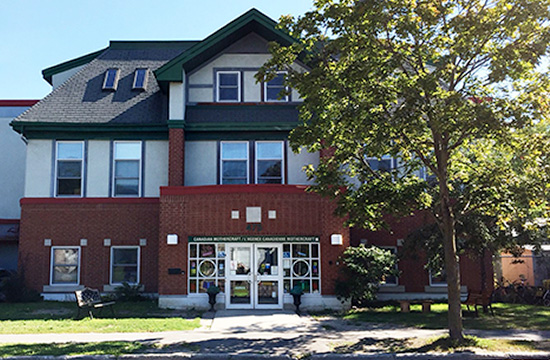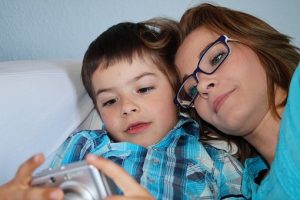Kinder Program
Full Time Alternative Kinder Program
*** Kinder Program Open House***
Our Alternative Kinder Program is an enhanced alternative to traditional kindergarten.
Our goal is to spark in children an enthusiasm and active interest in learning.
This program was developed more than 20 years ago in response to a need identified by parents. Families were looking for a structured kindergarten program that had a low Educator-to-child ratio and an environment that was nurturing and promoted the unique skills and interests of each child. In response, we created our innovative and enriched Full Time Alternative Kinder Program, which was designed from day one as an enhanced alternative to traditional kindergarten.
Our certified Educators combine meeting the Ministry requirements with an emergent curriculum based on the interests of the children, providing the best learning environment for children to grow intellectually and socially. Our curriculum is built to develop skills in the areas of literacy, numeracy, French, language, arts, computer technology, science, creative arts and physical activity. When your child leaves our Kinder program they are hands on and creative in their work and in their problem solving. They are ready to make friends, face new challenges and are excited about learning.
The core values underlying our Alternative Kinder Program
Learning Experiences
We believe that excellence in education starts early.
The skills your children will acquire in our Alternative Kinder Program will build their confidence, social skills and prepare them for the transition to a full primary school experience.
Here is an outline of some of the learning experiences your child will have this year as they explore the curriculum:
Speaking
Speaking
There will be daily opportunities for your child to express questions, ideas and opinions in large group discussions, with a partner and with adults. These opportunities are designed to encourage communication skills.Listening
Listening
Listening carefully is an important part of our language program. Children must learn to listen carefully in order to learn new facts and ideas and to understand instructions and directions. Developing listening skills will be emphasized in large and small group discussions.Reading
Reading
Research has proven that children learn to read by reading. The more they read and discuss what they’ve read, the better readers they will become. Our focus is on encouraging children to read for meaning, to understand what they are reading and to read more fluently. To reach this goal, the children will take part in many reading activities throughout the day.French Language
French Language
We ensure that the children receive a minimum of 180 minutes of French instruction daily, through a combination of direct and indirect teaching. Our French teacher is a part of the teaching team and speaks with the children in French throughout her day with them. The French language is introduced through songs, movement, games, stories and a variety of other activities. Through our French language program, children build speaking, reading and writing skills.What Our Families Are Saying
My family has been a part of Mothercraft for about 16 years. All five of my daughters have gone there and loved every minute. All through part-time, toddler, preschool, kinder, Funventure and even home child care, we have found our daughters have thrived and grown so much.
The full-time kinder program you offer is amazing, it did so much to help our girls get ready for new adventures in their new schools.
You could say that Mothercraft has become a big part of our family and we have recommended your programs to many families.
When our girls started elementary school for grade 1, their teachers found them to be advanced in many of their subjects. We will be sad when our last daughter graduates from Mothercraft. Thank you to all the Mothercraft staff for making our time there wonderful
I wanted to take a moment to tell you how very happy I have been with Mothercraft overall and specifically the teachers involved in Kinders. Being a part of a military family requires quite a bit of traveling and as a parent it is always difficult to find a school in an area that will provide a nurturing environment that recognizes your child’s unique abilities and responds with activities that encourage sharing strengths while also addressing weaknesses. This is also the first school in which the curriculum includes a variety of outside activities and field trips that encompass so much fun and education.
“J” wakes up every day asking if it is a school day because she is so excited to see her teachers and friends.
Thank you very much for providing an environment where she feels loved and is thrilled to explore the environment around her. We are going to miss her class and teachers next year but I am confident in the abilities that you have helped to instill in her to be successful in the future.
When my mother-in-law/caregiver suddenly had a stroke while caring for “T” our life was instantly turned upside down. It was with great relief that when I called you, you informed me that not only did you have a spot but that we were next on the list. Little did I know at that time how truly lucky I was. As with most first time parents, the prospect of leaving my little one in someone else’s care was scary but I quickly realized I had nothing to fear. Our integration week was one where Laurie was on morning duty and thus my first point of contact in the toddler room. Wow, did she impress the pants off me. Not only was she so incredibly welcoming but she knew us! She studied everything I wrote in “T”’s file. Within the first two hours I knew this place was home.I write this with a lump in my throat and a tear in my eye because everyone at Mothercraft that has cared for “T” has exceeded my expectations. Not only do I trust all the caregivers of Mothercraft but I like them too. You’re extended family and I know she and I will miss you all. I owe a special thanks to all of “T’s” Educators. Of course, this is not a permanent goodbye but it does seem final in some ways as she will be starting the next leap to school.
I am not so eloquent with words but I wanted you to know that you have helped build a truly special place at Mothercraft and I can’t tell you how fortunate and grateful we are to have been a part of it.
Need more information about the program?
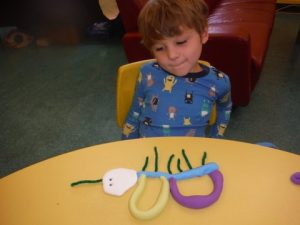 The program’s curriculum is guided by How Does Learning Happen: Ontario’s Pedagogy for the Early Years; The Kindergarten Program, 2016; and Early Learning for Every Child Today (ELECT): A Framework for Ontario’s Early Childhood Settings. These documents can be found on the Ministry of Education’s website.
The program’s curriculum is guided by How Does Learning Happen: Ontario’s Pedagogy for the Early Years; The Kindergarten Program, 2016; and Early Learning for Every Child Today (ELECT): A Framework for Ontario’s Early Childhood Settings. These documents can be found on the Ministry of Education’s website.
Programming is determined by and builds upon the interests of the children. Using the emergent curriculum philosophy, we provide a responsive engaging program. An emergent curriculum is one where the Educators and children work together; our experienced teachers combine meeting the Ministry requirements with a curriculum based on the interests of the children. We strive to make this spontaneous and responsive programming the basis for our day to day activities, which include developing skills in the areas of literacy, numeracy, French, language, arts, computer technology, science, creative arts and physical activity.
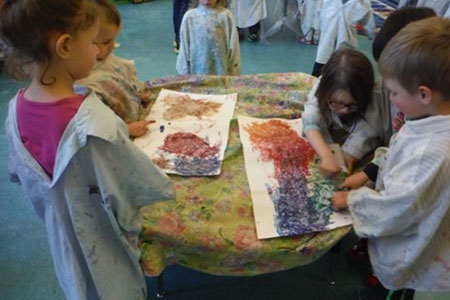 Our kinder teaching team members all have professional backgrounds as either registered Early Childhood Educators and/or certified primary teachers. The three kinder teachers work with your children throughout the core curriculum day as well as during the before and after school care and they are dedicated to providing the best learning environment for children to grow intellectually and socially.
Our kinder teaching team members all have professional backgrounds as either registered Early Childhood Educators and/or certified primary teachers. The three kinder teachers work with your children throughout the core curriculum day as well as during the before and after school care and they are dedicated to providing the best learning environment for children to grow intellectually and socially.
Our Alternative Kinder Program is based on current and well researched methodology and all teachers participate in ongoing professional development courses to stay current and innovative in the classroom.
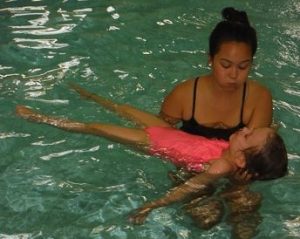 Physical activity is an important part of our curriculum and the children benefit from outdoor play twice a day. The play yards are spacious and allow the children to run, climb and play organized sports. During outdoor play they build important social skills that will give them the confidence they will need when they move into the larger environment of elementary school. The Westboro neighborhood is home to a number of beautiful parks, which we walk to regularly in the spring and summer. We also encourage a healthy lifestyle through the participation of a number of exciting activities such as swimming lessons (taken in the spring and fall), hip hop and/or salsa instruction (taught by qualified dance teachers) and an introduction to yoga.
Physical activity is an important part of our curriculum and the children benefit from outdoor play twice a day. The play yards are spacious and allow the children to run, climb and play organized sports. During outdoor play they build important social skills that will give them the confidence they will need when they move into the larger environment of elementary school. The Westboro neighborhood is home to a number of beautiful parks, which we walk to regularly in the spring and summer. We also encourage a healthy lifestyle through the participation of a number of exciting activities such as swimming lessons (taken in the spring and fall), hip hop and/or salsa instruction (taught by qualified dance teachers) and an introduction to yoga.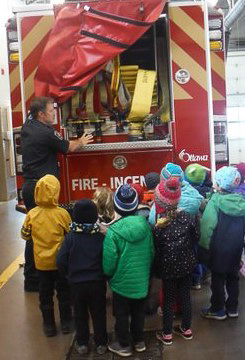 To stimulate multicultural awareness through games, arts, books, posters, photographs and discussion;
To stimulate multicultural awareness through games, arts, books, posters, photographs and discussion;- To construct a curriculum that fosters cognitive growth and is based on the children’s own interests and ideas;
- To support individuality through the respect of one’s self and the development of a sense of respect for other people;
- To foster creative freedom through the use of the arts, cognitive thinking and social/emotional development;
- To encourage socialization via play, which in turn will promote creative problem solving skills, compassion and patience for others;
- To provide a program that encourages children to be self-sufficient in all respects, while at the same time allowing the children to feel comfortable about asking for assistance if needed (either from a teacher or peers);
- To introduce basic computer skills in a fun and comfortable environment;
- To prepare the children, through discussion and literature, for the transition into a grade one program. This will assist in making the transition a natural and comfortable experience;
- To develop reading and writing skills through both phonics and the whole language approach;
- To increase children’s attention spans by providing exciting and new activities that challenge both their cognitive and physical abilities (in individual and group settings);
- To expand language development by encouraging the children to verbally express personal experiences, ideas and emotions.
- Set up a shelf with his/her favourite books;
- Make regular trips to the library;
- Ask the librarian to recommend good books;
- Give books as gifts;
- Let your child see you read, as children learn by imitating;
- Regularly read and share books and stories with your child in the language you are most comfortable with;
- Establish a regular daily reading time (e.g. after supper or before bedtime);
- Relate reading to everyday life situations (i.e. billboard, traffic signs, menus, TV guides, catalogues, labels, maps, etc.).
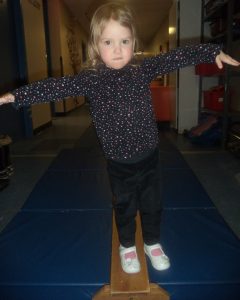
We have three basic rules in this program: safe bodies, safe feelings, and safe equipment. By providing a play-space with fewer restrictions and rules, we believe that the children are more in control of their environment. It is a place that truly belongs to them. This in turn creates a room full of happy children, happy families and happy Educators.
Monday
| 9:15 | Outside play |
| 10:15 | French |
| 11:00 | Cooking and structures |
| 12:00 | Lunch |
| 1:00 | Rest/quiet play(French) |
| 2:15 | Science/extra French |
| 3:30 | Snack and SURF |
| 4:15 | Outside play |
| 5:30 | Centre is closed |
Tuesday
| 9:15 | Outside play |
| 10:15 | French |
| 11:00 | Learning Centres or Exercise class (Feb. and March only) |
| 12:00 | Lunch |
| 1:00 | Rest/quiet play(French) |
| 2:15 | Group time |
| 3:30 | Snack and SURF |
| 4:15 | Outside play |
| 5:30 | Centre is closed |
Wednesday
| 9:15 | Outside play |
| 10:15 | French |
| 11:00 | French learning centres |
| 12:00 | Lunch |
| 1:00 | Rest/quiet play(French) |
| 2:15 | Group time |
| 3:30 | Snack and SURF |
| 4:15 | Outside play |
| 5:30 | Centre is closed |
Thursday
| 9:15 | Outside play |
| 10:15 | French |
| 11:00 | Dance |
| 12:00 | Lunch |
| 1:00 | Rest/quiet play(French) |
| 2:15 | Group time |
| 3:30 | Snack and SURF |
| 4:15 | Outside play |
| 5:30 | Centre is closed |
Friday
| 9:00 | Swimming lessons (fall and spring sessions)/Outside play |
| 10:15 | French |
| 11:00 | French board games/Group time/Learning centres (Feb. and March only) |
| 12:00 | Lunch |
| 1:00 | Rest/quiet time(French) |
| 2:15 | Group time |
| 3:30 | Snack and SURF |
| 4:15 | Outside play |
| 5:30 | Centre is closed |


